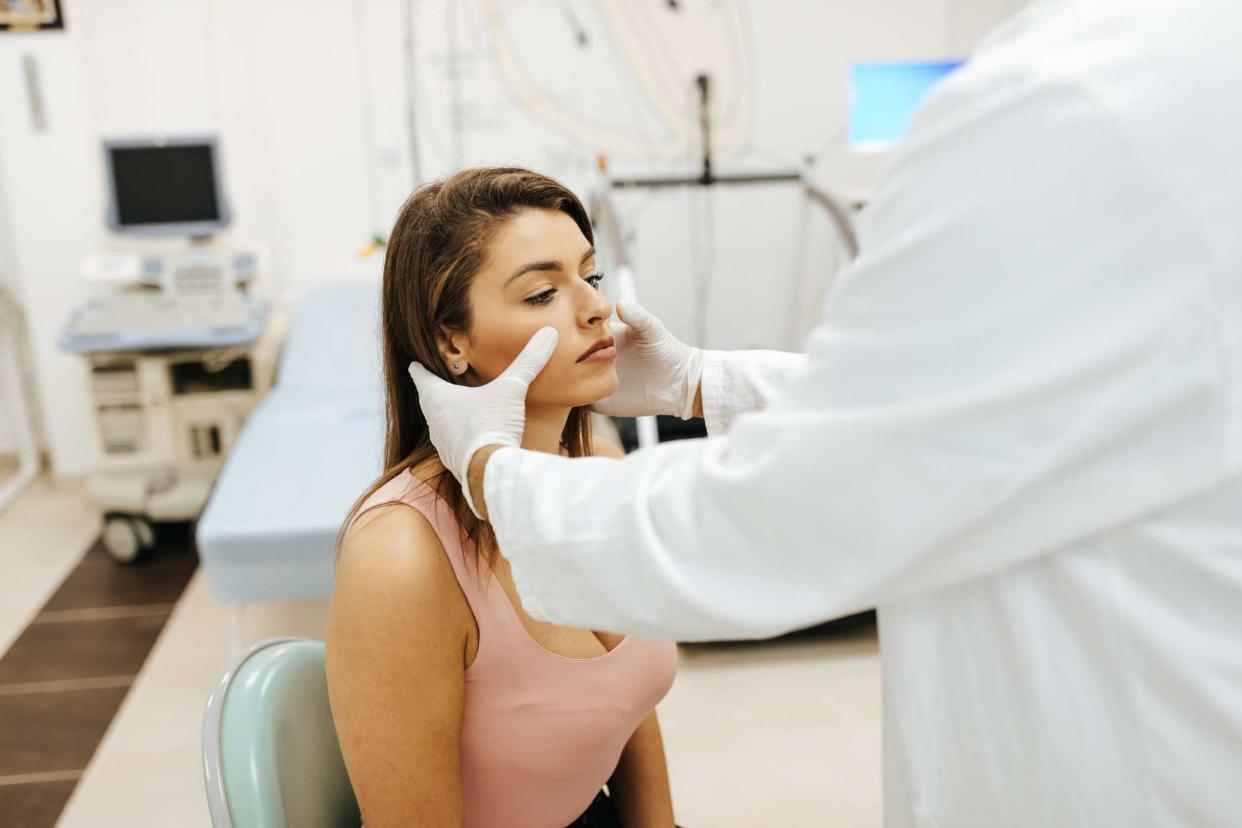What Are Nasal Polyps?

bojanstory / Getty images
Medically reviewed by Benjamin F. Asher, MD
Nasal polyps are benign (non-cancerous) growths that develop inside the nose or sinuses. Common causes of nasal polyps include asthma, allergies, and chronic sinus infections. Nasal polyps are typically not painful, but they can lead to symptoms like nasal congestion and difficulty breathing.
Certain medications can help shrink or stop the growth of nasal polyps. Your healthcare provider can help you determine the cause of your polyps and find the most appropriate treatment.
Nasal Polyps Symptoms
Not all nasal polyps cause symptoms, especially if they stay small. If you do have symptoms, they may include:
Stuffy, runny, or blocked nose
Sneezing
Headache (usually with the presence of a sinus infection)
Snoring
Loss of sense of smell or taste
Small, benign polyps are typically not sensitive to the touch or prone to bleeding. If you regularly experience nosebleeds or have regular pain, you should seek medical care.
What Causes Nasal Polyps?
Nasal polyps are typically caused by chronic inflammation and swelling. This may be due to:
Infections: Chronic infections, including rhinosinusitis (sinus infections) and infections caused by Staphylococcus aureus bacteria—also known as staph infections—are often linked to nasal polyps. Approximately 20% of people with chronic rhinosinusitis have nasal polyps.
Asthma: An estimated 20-60% of people who have chronic rhinosinusitis with nasal polyps also have asthma. This is especially common among people with untreated or poorly controlled asthma.
Allergic rhinitis (hay fever): Repeated allergic reactions, especially hay fever—seasonal allergies caused by pollen—often contribute to the growth of nasal polyps. This may be due to an increase in the number of eosinophils, a certain type of white blood cell, in response to an allergen.
Aspirin intolerance: Some people who take aspirin regularly develop aspirin-exacerbated respiratory disease (AERD), which involves hypersensitivity to aspirin alongside symptoms of asthma and chronic rhinosinusitis. Many people with AERD develop nasal polyps over time.
Risk Factors
Anyone can develop nasal polyps, but certain factors can make you more likely to experience them. For instance, living in a region with high pollen counts or air pollution can put you at higher risk for nasal polyps. Other factors might include having certain conditions or medical history, such as:
Asthma
Chronic allergies
Churg-Strauss syndrome (inflammation of the blood vessels)
Cystic fibrosis (a disorder that affects the respiratory and digestive systems)
Family history of nasal polyps
Past nasal injuries or surgery
Recurring infections
How Are Nasal Polyps Diagnosed?
To diagnose nasal polyps, your healthcare provider will first perform a physical examination and review your symptoms, medical history, and family history. They may also use any of the following tests to make a diagnosis:
Allergy tests
Lab tests, such as blood and imaging tests
Nasal endoscopy (a procedure that involves looking at the nose with a long, thin tube-like device and tiny camera called an endoscope)
Treatments for Nasal Polyps
The first-line treatment options for nasal polyps are typically medications, such as:
Nasal saline rinses
Nasal corticosteroids, such as Flonase (fluticasone) and Rhinocort (budesonide)
Oral corticosteroids, such as Deltasone (prednisone)
Injectable corticosteroids, such as Kenalog (triamcinolone acetonide)
Monoclonal antibodies, such as Dupixent (dupilumab) and Xolair (omalizumab)
If your symptoms persist or get worse over time, you may need a surgical procedure known as a polypectomy to remove your nasal polyps. Typically, this can be done in an outpatient setting.
How to Prevent Nasal Polyps
Nasal polyps can’t always be prevented. If you have an underlying health condition, such as chronic sinus infections, allergies, or asthma, you may be able to prevent polyps from growing by following your healthcare provider’s instructions for treating your condition. For example, you may need to take antihistamines to treat allergies or antibiotics to treat a bacterial infection.
If you have surgery to remove a nasal polyp, your healthcare provider might also prescribe a topical steroid to apply to the inside of your nose after surgery. This can help prevent a recurrence of nasal polyps.
Complications
Severe health complications from nasal polyps are relatively rare. However, if nasal polyps become too large, they can lead to the following complications:
Difficulty breathing
Nasal obstruction
Bleeding
Obstructive sleep apnea (OSA)
Orbital cellulitis (infection of the tissue surrounding the eye)
Meningitis (inflammation of the membranes surrounding the brain and spinal cord)
Thromboembolism (a blood clot obstructing blood flow)
If you are experiencing frequent nosebleeds or having trouble breathing or sleeping due to nasal polyps, it's important to seek medical care. You should also contact a healthcare provider immediately if you are showing signs of any of the above conditions.
A Quick Review
Nasal polyps are soft, benign growths that develop inside the lining of the nasal cavity due to chronic inflammation. They are often caused by long-term swelling from having respiratory problems, allergies, sinus infections, or aspirin intolerance.
Medications, such as corticosteroids, may help to shrink nasal polyps or keep them from growing back. If your symptoms don’t resolve with medication, you may need surgery to remove the growths.
Frequently Asked Questions
Can you pull a nasal polyp out with tweezers?
No, you shouldn’t try to remove your polyps by yourself. This could lead to serious injury, bleeding, and infection. Nasal polyps should be removed by a licensed healthcare provider.
When should nasal polyps be removed?
Nasal polyps may need to be removed if they continue to grow or recur after other treatments have failed. Surgical removal may also be necessary if you have trouble breathing or lose your sense of smell. Talk to your healthcare provider if you’d like to have your polyps removed.
What doctor should you see if you have nasal polyps?
Nasal polyps are often treated by an ear, nose, and throat (ENT) specialist, also known as an otolaryngologist. Depending on the cause of your polyps and your primary care provider’s referral, you may also see other healthcare providers. Potential examples include allergists and pulmonologists.
For more Health.com news, make sure to sign up for our newsletter!
Read the original article on Health.com.

